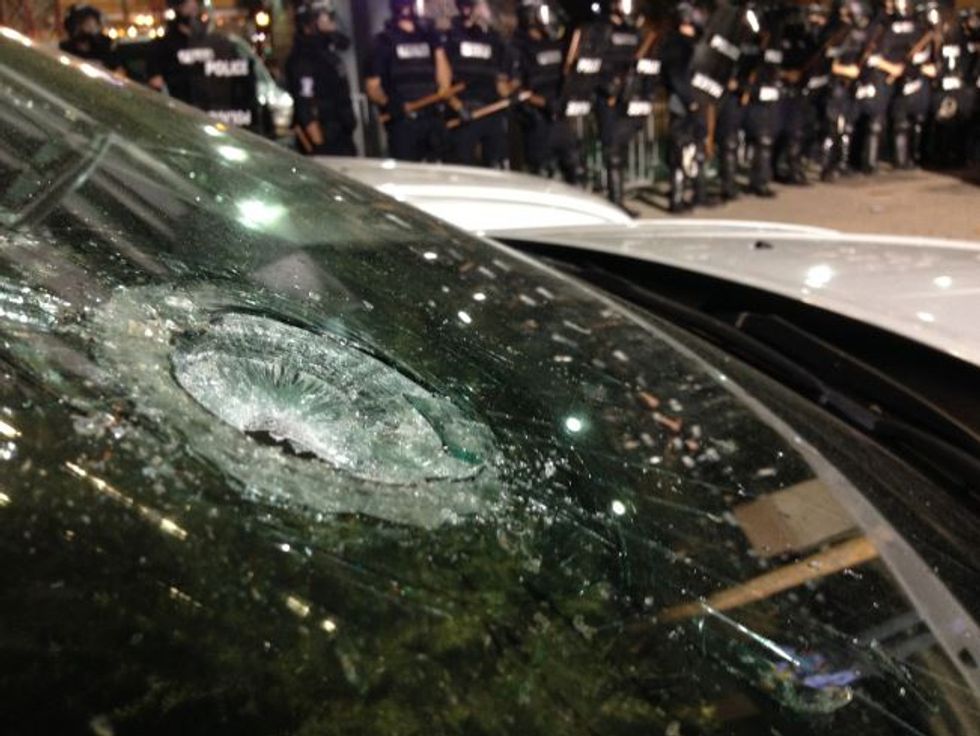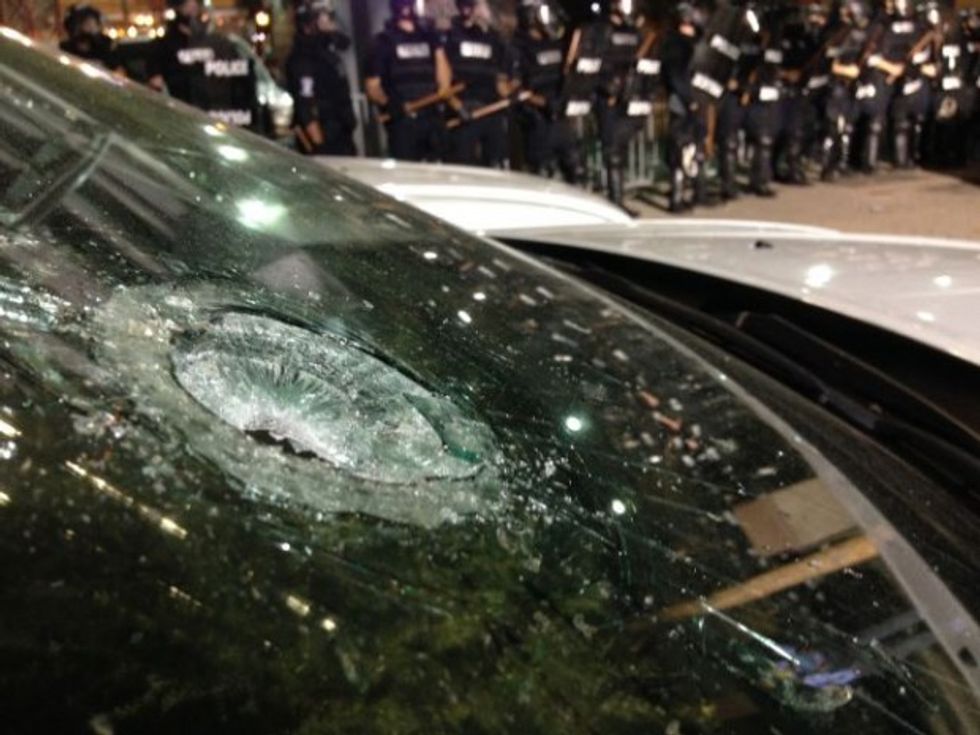
A police vehicle is damaged as police fire teargas as protestors converge on downtown following Tuesday's police shooting of Keith Lamont Scott in Charlotte, N.C., Wednesday, Sept. 21, 2016. (AP Photo/Allen Breed)

Something invaluable was tossed aside in Charlotte, North Carolina, recently both by those making the news, rioting in the wake of a policeman’s shooting death of a black man, as well as those reporting it.
First, the fact the policeman involved was black, as is Charlotte’s police chief, did not deter rioters from attacking white victims in response—forcing one man to beg for mercy and trying to knock another into a fire.
Second, while peaceful protests by local residents looking to improve life in their community might be a natural outcrop from such a shooting, many of the rioters arrested were not even from the Charlotte area.

But, third, and most tragically, is the knee jerk reaction by violent activists who refuse to grasp the reality of race victimology.
Black Lives Matter advocates and its supporters need to take a reality walk.
According to a U.S. Department of Justice report analyzing U.S. murders between 1980-2008, the differential in murder rates between those committed by whites (45 percent) and blacks (52 percent) may not seem significant—until you factor in that blacks represent only 13 percent of the total U.S. population. Thus, indisputably, blacks have an historic propensity—verified for almost one and a half generations—to commit murder at a much greater annual rate than do whites.
Again, examining historical records, an FBI report shows between 2009-2013, over 90 percent of black murder victims were killed by fellow blacks.
These reports, along with others, reveal a consistent murder track record that, for Black Lives Matter and its supporters, is an inconvenient truth, i.e., the only thing blacks have to fear is their fellow blacks!
But, for Black Lives Matter activists, reality be damned, full speed ahead in blaming whites as overwhelming perpetrators of violence against blacks.
In the comparatively few instances where blacks have been victims of white violence, we have seen violent hair-trigger reactions by black community members—often induced either by inaccurate media reports or race activists spewing untruths. And, it matters not where the community then turns its anger.
Meanwhile, for each incident of whites killing blacks, there are multiple cases of blacks killing whites. One report suggests blacks are 27 times more likely to attack whites than whites are to attack blacks. But where is the outrage from white communities? Where are the riots?
The 1992 acquittal of four white police officers for brutally beating a black man, Rodney King, led to black riots in Los Angeles, California. Yet the 1995 acquittal of a black man, O.J. Simpson, for the deaths of two white murder victims, generated no similar violence from the white community.
When a black is killed at the hands of police, regardless of the race of the officer involved, often the black community’s response is no justification exists for the shooting, regardless of circumstances surrounding the victim’s demise.
Even in a situation in which an armed black suspect turned and pointed his weapon at a pursuing black policeman and was shot, the black community continued to engage in violent protest after learning the circumstances concerning the death.
This remains the situation even after Black Lives Matter insisted police wear cameras and footage taken by those cameras justified the police action.
There is only one reason why black communities react violently to police shootings. It is not out of desire to improve one’s community. It stems from a sense of entitlement—i.e., one to riot. It is just such an entitlement sense that brought 70 percent of the rioters arrested in Charlotte from out of town. These were not protestors but agitators in search of their entitlement—most often found in a local store they had trashed.
Further evident that improving community life was of no interest to some activists in Charlotte was the shooting death of protestor Justin Carr by protestor Rayquan Boram. Overwhelming black-on-black murder statistics could not escape Charlotte where both protestors were black. (Social media photos showed an armed Borum promoting himself as “Pistol Quan.”)
The investigation into Keith Lamont Scott’s shooting death, sparking the Charlotte riots, is ongoing. Police claim he held a gun; others claim it was only a book. Scott’s family claims he did not own a gun. Photos taken by witnesses do show a gun on the ground, but no book.
There are some who, unfettered by the facts, seek to continue fueling the emotional fires of the incident. NAACP Charlotte chapter president Corine Mack, noting a determination whether a gun or a book was involved is important, says, “in my mind and in most of the community’s mind, it really doesn’t matter if he had a gun.”
Such a dismissive comment rolls easy off the lips of one not having to face the barrel of a gun in the heat of confrontation.
Despite the violence that took place in Charlotte, some in the media, for whatever reason, call the protests peaceful. Try to explain that to the owners of businesses broken into, renters of apartments where windows were shattered, drivers of cars upon whose vehicles rocks were dropped.
Unwilling to leave it at that, the media also pushed the false perception the police shooting victim, Scott, was a “quiet family man.” Ignored was the reality he had been convicted of assault with a deadly weapon in two states and assault in three—two of which included assaults on a child and a female.
It is clear what was cast aside in Charlotte, both by the media and the rioters, was truth.
While the loss of any life is cause for concern, violent reactions by black community members to deaths of fellow blacks by police, whether justified or not, in places like Charlotte, North Carolina, or Ferguson, Missouri, or Baltimore, Maryland, or Milwaukee, Wisconsin, perpetuate an entitlement myth unsupported by reality.
If anti-police activists truly wish to channel their hatred against those responsible for the vast majority of violent deaths of blacks, they need look into the mirror.
–
TheBlaze contributor channel supports an open discourse on a range of views. The opinions expressed in this channel are solely those of each individual author.